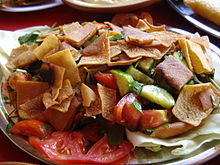Culture
Syria is a traditional society with a long cultural history. Importance is placed on family, religion, education, self-discipline and respect. The Syrians' taste for the traditional arts is expressed in dances such as the al-Samah, the Dabkeh in all their variations, and the sword dance. Marriage ceremonies and the birth of children are occasions for the lively demonstration of folk customs.
Arts
The literature of Syria has contributed to Arabic literature and has a proud tradition of oral and written poetry. Syrian writers, many of whom migrated to Egypt, played a crucial role in the nahda or Arab literary and cultural revival of the 19th century. Prominent contemporary Syrian writers include, among others, Adonis, Muhammad Maghout, Haidar Haidar, Ghada al-Samman, Nizar Qabbani and Zakariyya Tamer.
Ba'ath Party rule, since the 1966 coup, has brought about renewed censorship. In this context, the genre of the historical novel, spearheaded by Nabil Sulayman, Fawwaz Haddad,Khyri al-Dhahabi and Nihad Siris, is sometimes used as a means of expressing dissent, critiquing the present through a depiction of the past. Syrian folk narrative, as a subgenre of historical fiction, is imbued with magical realism, and is also used as a means of veiled criticism of the present. Salim Barakat, a Syrian émigré living in Sweden, is one of the leading figures of the genre. Contemporary Syrian literature also encompasses science fiction and futuristic utopiae (Nuhad Sharif, Talib Umran), which may also serve as media of dissent.
Popular culture
The Syrian music scene, in particular that of Damascus, has long been among the Arab world's most important, especially in the field of classical Arab music. Syria has produced several pan-Arab stars, including Asmahan, Farid al-Atrash and singerLena Chamamyan. The city of Aleppo is known for its muwashshah, a form ofAndalous sung poetry popularized by Sabri Moudallal, as well as for popular stars like Sabah Fakhri.
Television was first introduced to Syria in 1960, when Syria and Egypt (which adopted television that same year) were part of the United Arab Republic. It broadcast in black and white until 1976. Syrian soap operas have considerable market penetration throughout the eastern Arab world.[173]
Nearly all of Syria's media outlets are state-owned, and the Ba'ath Party controls nearly all newspapers.[174] The authorities operate several intelligence agencies,[175] among them Shu'bat al-Mukhabarat al-'Askariyya, employing a large number of operatives.[176]
Sports
The most popular sports in Syria are football, basketball, swimming, and tennis. Damascus was home to the fifth and seventh Pan Arab Games. Many popular football teams are based in Damascus, Aleppo, Homs, Latakia, etc.
The Abbasiyyin Stadium in Damascus is home to the Syrian national football team. The team enjoyed some success, having qualified for four Asian Cup competitions. The team had its first international on 20 November 1949, losing to Turkey 7–0. The team was ranked 138th in the world by FIFA as of May 2013.
Cuisine
Linked to the region of Syria where a specific dish has originated, Syrian cuisine is rich and varied in its ingredients. Syrian food mostly consists of Southern Mediterranean, Greek, and Southwest Asian dishes. Some Syrian dishes also evolved from Turkish and French cooking: dishes like shish kebab, stuffed zucchini,yabra' (stuffed grape leaves, the word yapra' derıves from the Turkish word 'yaprak' meaning leaf).
The main dishes that form Syrian cuisine are kibbeh, hummus, tabbouleh, fattoush,labneh, shawarma, mujaddara, shanklish, pastırma, sujuk and baklava. Baklava is made of filo pastry filled with chopped nuts and soaked in honey. Syrians often serve selections of appetizers, known as meze, before the main course. Za'atar, minced beef, and cheese manakish are popular hors d'œuvres. The Arabic flatbread khubzis always eaten together with meze.
Drinks in Syria vary, depending on the time of the day and the occasion. Arabic coffee, also known as Turkish coffee, is the most well-known hot drink, usually prepared in the morning at breakfast or in the evening. It is usually served for guests or after food. Arak, an alcoholic drink, is also a well-known beverage served mostly on special occasions. More examples of Syrian beverages include Ayran, Jallab, White coffee, and a locally manufactured beer called Al Shark.




0 comments:
Post a Comment